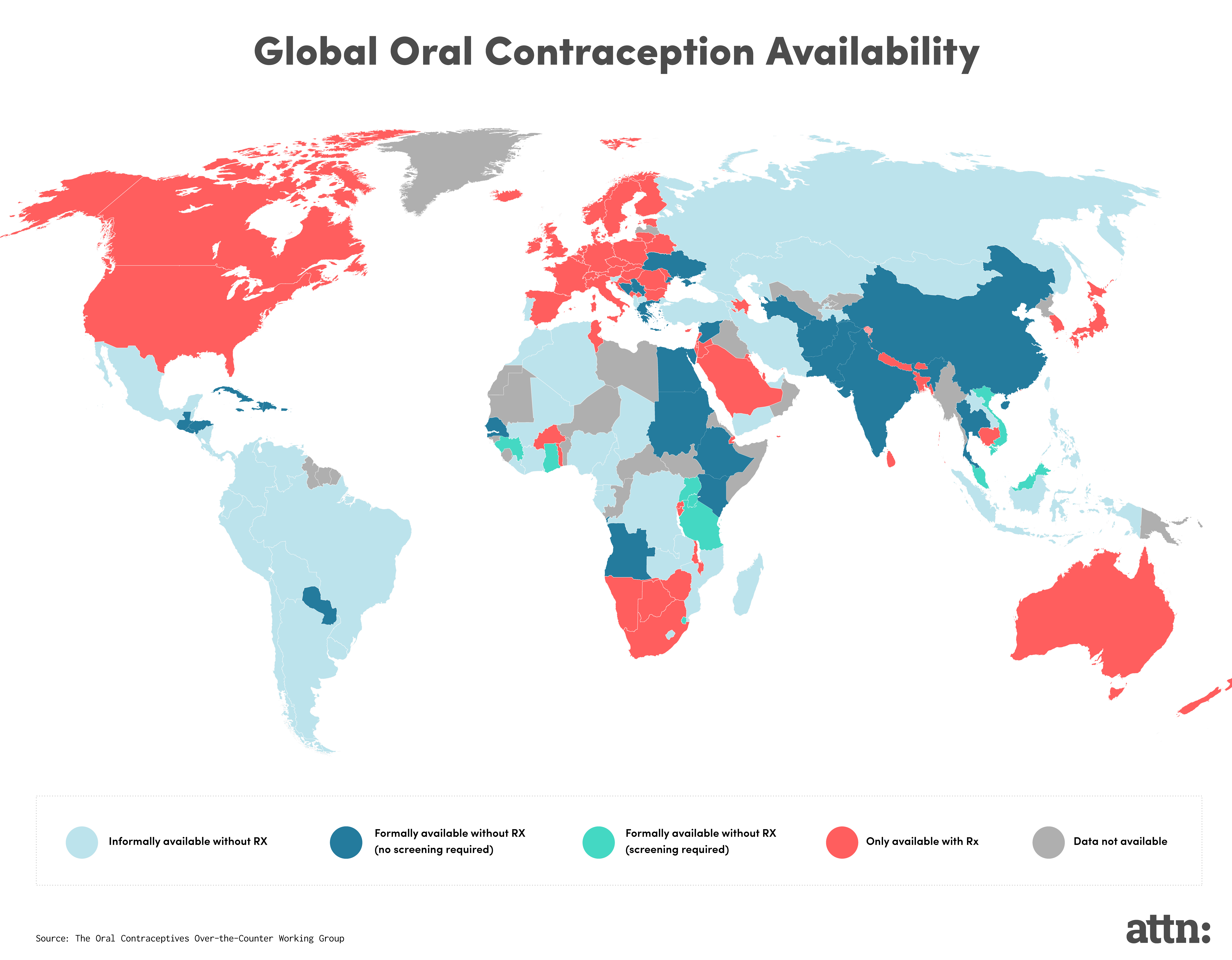These Countries Provide Better Birth Control Access Than The U.S.

By:
The requirement for a birth control prescription can range from merely annoying to incredibly disruptive.
In 2011, nearly half (45 percent or 2.8 million) of the 6.1 million pregnancies in the United States were unintended, the Guttmacher Institute reports.
As a result, the unintended pregnancy rate is significantly higher in the United States than in many other wealthy countries.
One of the major contributing factors is access to birth control.
In 2013, family planning services helped women avoid 2 million unintended pregnancies, which would likely have resulted in about 1 million unplanned births and nearly 700,000 abortions, Guttmacher reports.
Beyond its benefits as a family planning tool, Nicholas Kristof wrote for the New York Times in 2011 that governments across the globe should embrace birth control access "as a cost-effective strategy to reduce poverty, conflict and environmental damage."
The New York Times reported also reported that over-the-counter birth control poses fewer dangers than Motrin and Sudafed. Plus, making birth control pills available over the counter would remove the biggest barrier to proper use — when “you run out on a Saturday night, you lose your pills, you go on vacation, you can’t get a doctor’s appointment,” as gynecologist Daniel Grossman said to the Times.
So why isn't birth control available over-the-counter in the United Sates?
Contraceptive policy is a sensitive issue in American politics, in which barriers to over-the-counter birth control are attempts to appease religious conservatives, noted The Times. Aside from politics, gynecologists seem divided on the issue. A poll found that a majority of gynecologists and family doctors in training opposed the the sale of over-the-counter birth control, worried mainly about safety and misuse.
So how does the U.S. compare to other countries in terms of access to birth control?
Well, it might depend on the state where you live, but overall, women can obtain birth control in the United States with a prescription. However, according to the Kaiser Family Foundation, the current requirement for a prescription for hormonal contraception may serve as a barrier to access for many women.
The following countries provide women with easier access to birth control than the United States, highlighting how far we have to go.

International nonprofit organization Ibis Reproductive Health, which coordinates The Oral Contraceptives Over-the-Counter Working Group, gathered data used in the map above. In countries where birth control is "informally available without RX," a prescription is legally required for over-the-counter birth control, but women typically can get them without a prescription in pharmacies or other retail outlets. In countries where the pill is "formally available wihout RX," women do not need a prescription, but a screening by a trained health professional (such as blood pressure checks or answering questions about medical history) might be needed.
Kate Grindlay, associate project director for the nonprofit, told ATTN: via email why certain countries require a prescription while others do not:
"The United States, Canada, and most of Western Europe require a prescription, while the pill is available over the counter informally in much of Central and South America and legally in much of Southern Asia. Part of this may be related to country income, with lower and middle income countries tending to permit non-prescription access to the pill, and higher income countries, such as Australia, Japan, and countries in North America and western Europe, generally requiring a prescription. Some countries with laws on the books legally permitting the pill to be sold over the counter, such as China or India, also tend to be places with robust national family planning programs. However, trends moving towards [over-the-counter] and pharmacy access have begun to emerge in high-income countries as well."
According to Grindlay, more than 100 countries permit non-prescription pill access. Those countries' experiences with over-the-counter provisions and their safety and effectiveness could provide important evidence for the United States and other countries as they consider removing their own prescription requirements:
"It is useful for countries like the US to look to and learn from these countries' experiences, and also to see that this idea isn’t new—it is widespread worldwide, and has been for decades," Grindlay said.
On the topic of making birth control available over-the-counter, Lori Adelman, associate director of global communications at Planned Parenthood told ATTN: via email:
“Planned Parenthood supports expanding access to birth control, which includes making it available over-the-counter and protecting insurance coverage so that it is affordable for all women. American College of Obstetricians and Gynecologists (ACOG) agrees birth control pills should be available without a prescription over-the-counter, but only if they continue to be fully covered by insurance. Without insurance coverage, birth control pills can cost up to $600 a year, making it out of reach for many women already struggling. But, the decision to bring birth control over-the-counter should be left to the medical experts and scientists at the Food & Drug Administration (FDA), not to politicians.
 kadmy via bigstock
kadmy via bigstock
According to Adelman, Planned Parenthood supports partners around the globe who are fighting to expand sexual and reproductive health care in their communities:
"History and experience show that birth control has the power to transform people’s lives — especially women's and girl's — for the better everywhere in the world. Access to contraception and comprehensive sexuality education are proven to support people's ability to pursue education, and are associated with lower teen pregnancy rates.”
